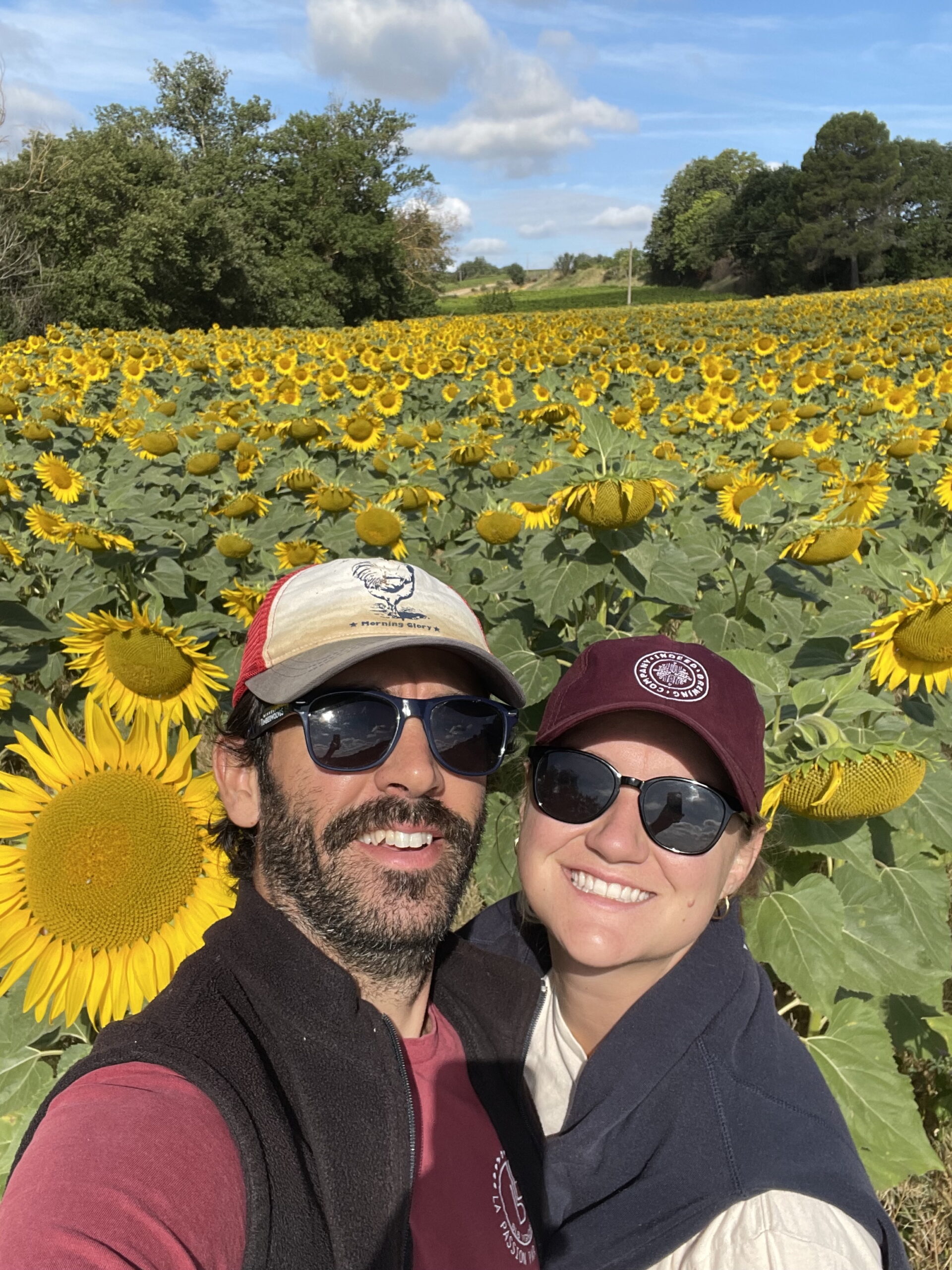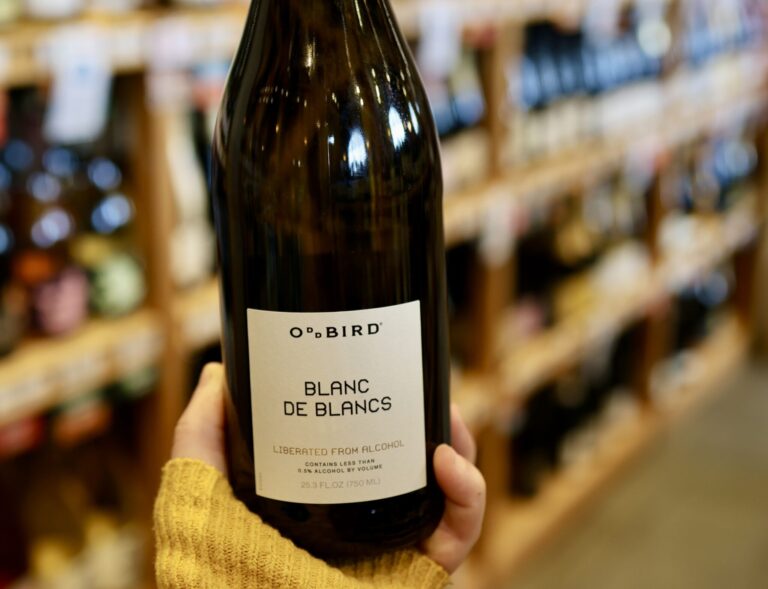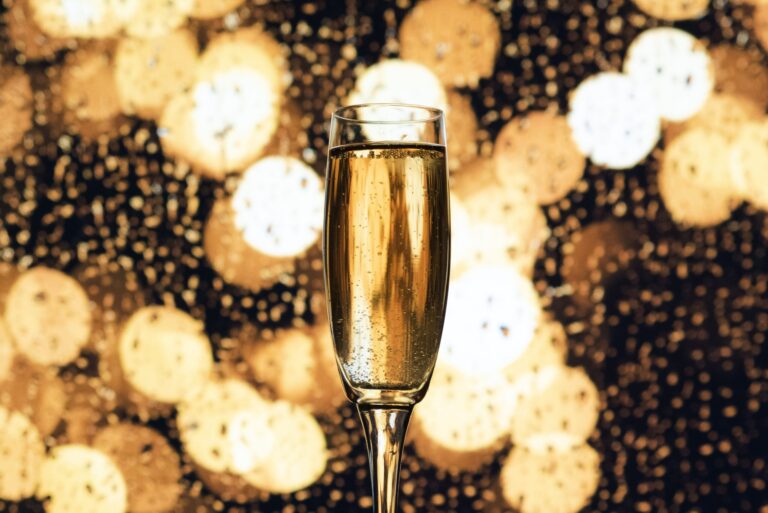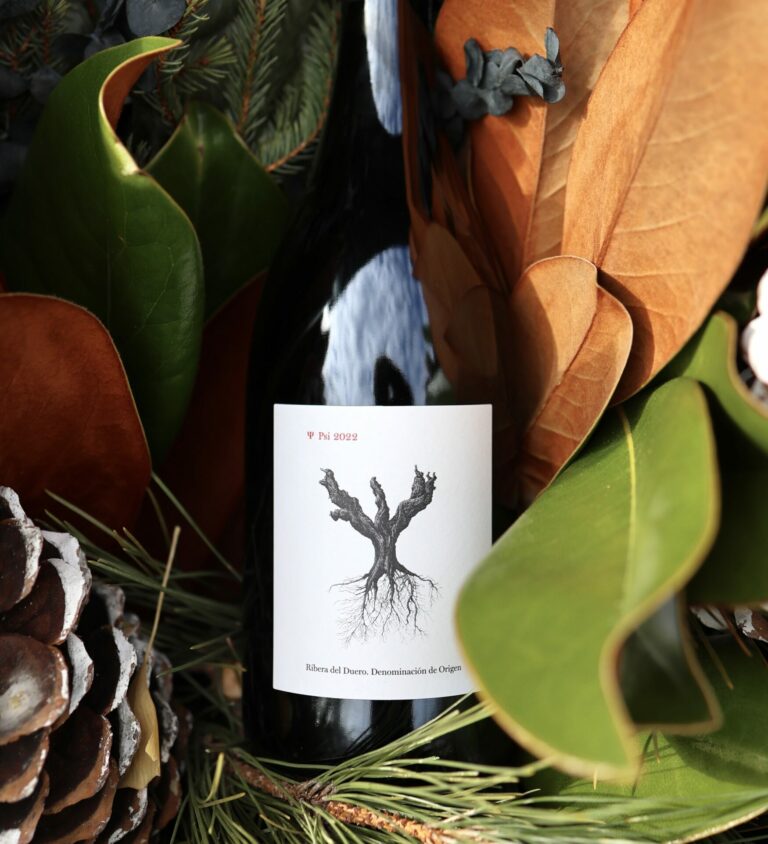We’ve all been there. Sitting there in the middle of a Minnesota winter thinking, “wow I’d really rather move to France and work on a vineyard”. Claire Nitschke did just that. During the pandemic, she moved to France to live the dream, farm a family vineyard, and adjust to the slow life of a 120 person village in the Languedoc. Before this adventure though, nearly a decade ago, Claire was a member of our floor staff here at France 44. We’re excited to share our interview with Claire about the special region of France she inhabits and the challenges and victories of everyday life on a vineyard.
What prompted you to move from Minneapolis to France?
“First, Morgan (my husband) is French.
We met and started dating in 2019 in the Willamette Valley and then covid arrived and we had to be flexible and decisive. I applied for a Master of Science Enology and Viticulture at Montpellier SupAgro and a French student visa. Morgan and I moved to Montpellier together in the summer of 2020. Since then, we’ve lived/worked/studied in Montpellier, Bordeaux, and Rheingau in Germany. Now we are settled in our village of Routier in the AOP of Malepère in the Languedoc area in the south of France. Morgan’s family has farmed a vineyard here for many years.
The chance to come to his family land and take up the mantle of heritage was something we felt was important. We are very lucky to have these vines and this land from the investments of Morgan’s family before him.”
Tell us about your family’s vineyard! What makes it special?
“This land has been toiled over for a very long time!
There have been vines planted and managed here for many hundreds of years.
We are in the Malepère region of the Languedoc. We have 23 hectares (57 acres) of Bordeaux varieties; Cabernet Franc, Merlot, Malbec, and Cabernet Sauvignon. In 2024, Morgan took over as head of the company and now we farm the vineyard together with the assistance of his father.
In the Gallo-Roman times (1st century BC to 5th AD) there was a villa here on the property. In the Antiquities Museum of Bram, there are artifacts on display that were found in our vines while plowing. I delight in finding roman bricks in the Cabernet Franc plots. Most of the current building, Domaine Escarguel, is built from the stones taken from the ruins of the roman villa (the locals call the property Castel Vielh (Old Castle in the Occitan dialect)).
In the 1700s, the house and lands were owned by and managed by Lazare Escarguel and his family; he was a prominent politician and founding member of the newspaper L’Indépendant.”
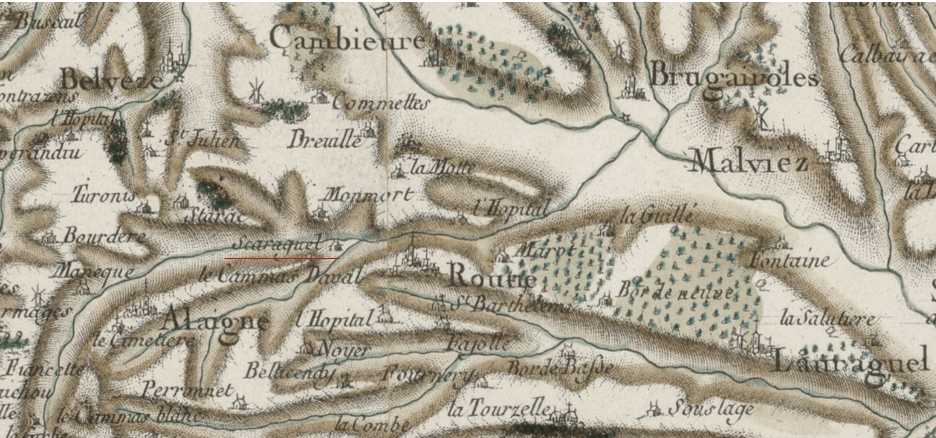
Can you share a bit about Languedoc?
“Languedoc is very special- it’s a large area that spans many different sub-appellations, landscapes, and climates. You can find red, white, rose, and sparkling wines here. Sparkling wine is said to have been invented here in Limoux! Dom Pérignon allegedly studied at the Abbaye of Saint-Hilaire and brought the techniques back to Champagne. There is a diversity of production, as well. Small producers and lots of large vineyards, there are generational family farms and foreign transplants, there are family domains and huge cooperatives exist in the same appellations and villages. The cooperative system was designed so the many vine growers could combine forces and have a central wine making apparatus to bulk produce the wine. There is really the whole spectrum of vine growing and winemaking represented in this area, and it makes it a unique place to find innovation as well as traditional approaches to the industry–There are vignerons planting non-traditional and drought tolerant varieties and less recognized local vines, both ends of the heavily mechanized industrial cultivation and human scale, all by hand farming are represented in this large and diverse area. Our own vineyard survives by combining mechanic cultivation on some parcels while our more promising parcels are hand pruned and receive a lot of human attention throughout the season.”
Did you have any wine-making experience when you took over the family vineyard?
“Yes, we both traveled and studied to get experience in different wine regions around the world. Claire had her first experience of a vintage in 2016 in Willamette Valley, Oregon at Lingua Franca and has worked in California (Bedrock Wine Co.), New York (Redhook Winery), Italy (Chiara Boschis), and Austria (Kolfok, Wellanschitz Wiengut) in the years before landing in France.
Morgan started in France in Provence (Pech Redon, Chateau d’Esclans), South Africa (Joostenberg Wines), Columbia Gorge (Cascade Cliffs), Bordeaux (Chateau Pape Clement), and more throughout Germany and France.”
What are some of the challenges you face running the vineyard?
“Every year farmers face many challenges, some more predictable than others. With the acceleration of climate change and climate crisis, our little corner of the world has borne witness to a lot of record making weather in recent vintages. Our winter work scheduling is condensing into a tighter and tighter time frame between when the vines go dormant and when the warmer temperatures wake them up. Conversely, the last frost date is edging later and later adding risk to total crop loss if the tender young shoots freeze.
We are relatively young and have changed our vines from conventional viticulture to organic cultivation. As we change our farming approach, we can no longer rely on the records of the past–we are sure to discover new challenges and adapt and fine tune our framework in a way that only experience can show us.
With grapes maturing on a tighter timeline (this year our Cooperative harvested Merlot in August! That is over 3 weeks earlier than 2024) it requires a lot of agility to react to and proactively counter all the curveballs the changing climate is throwing at us. We’ve had pretty low yields the last few seasons (droughts, floods, hail damage) so our business of selling in bulk to the Cooperative is not continuing to be sustainable. Soon, we will make our own wine and have a better chance at surviving in the market as producers than as members of our cooperative.
Young people are drinking less wine than previous generations, and there are more alternatives to compete with on the market than ever before. But there is a reason this beverage has been popular for thousands of years. So much of wine is a social experience, whether you enjoy it with your partner in your home, at a fun bar with your friends, or simply open a bottle that reminds you of that one time with your mom, the joy wine can bring is worth continuing the tradition.”
What are some things you love about your new lifestyle on the vineyard? What makes the work fulfilling / exciting?
“We love working outside and while certain seasons seem longer than others, the work mirrors the passing of time. Winter days are shorter, in fall we reap the bounty the summer sun helped produce. The ritual of the work reflects a world larger than us, we are participating in and witnessing fantastic biological changes, chemical changes, and our own life changes through the vineyard.”




Where do you see yourself / your business in 5 years?
“We are excited to be laying our foundations for making our own wine in the near future and bottle something that reflects our love of the work and the land. We are in the process of adding 5 hectares of vines from Limoux Appellation to our purview which includes white varieties like Sauvignon Blanc and Mauzac. So next year we will be making some fresh whites! In the following years after that, the portion of our domain vineyard we’ve been cultivating with high attention will be out of cooperative contract and free for us to make our first vintage with estate fruit. That will include Merlot planted by Morgan’s grandparents in the 80s and Cabernet Franc.”
When will we be able to buy your wine in Minneapolis?! How can we follow along on your journey online?
“We have our fledgling Instagram account (@Castel_Vielh)
We plan to start making wine next year if all goes according to plan and even more in the next three years. We will be looking for distribution partners in the future and Minneapolis is at the top of our list to get our wines on shelves! In the meantime, come visit us, make an introduction, or open your favorite bottle of Languedoc wine.”
Many of us daydream about moving to France and running a vineyard – is it worth it?!
“For me, yes! For others, hard to say! The price is steeper for me than Morgan. I’m far from family and friends. I miss the Minneapolis social scene and the ability to buy and drink really good beer. I do love the slower lifestyle – our village has 120 people in it and no cafe or bakery so it’s good to know our neighbors and participate in the village festivities. To get here, there are a lot of hoops to jump through, administration, financial, logistics, that will wear you down if you aren’t really motivated. If you are inspired, I would find a winery in the US to try your hand at a harvest as a first step!
If turning over and moving your whole life across the ocean isn’t feasible- wine is a great way to take a trip and time travel from wherever you are. Open a bottle from a particular place in 2016 and taste the hot, dry summer months and the easy cool fall- or a rare bottle from a year with fires when only some early grapes came in- or a bottle you got as a holiday gift and smile with a memory of the people you got it from! A snapshot of world of wine can fit inside a shop like France 44 and you only need to change aisles to travel from Australia to Italy and have the chance to taste the wines – without the long farm hours and visa applications.”

